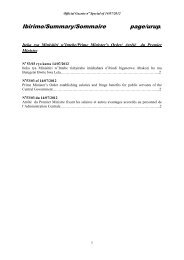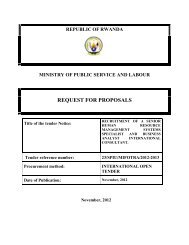MINALOC - Mifotra
MINALOC - Mifotra
MINALOC - Mifotra
You also want an ePaper? Increase the reach of your titles
YUMPU automatically turns print PDFs into web optimized ePapers that Google loves.
<strong>MINALOC</strong>, Functional Review draft, 31 March 2008<br />
The general diagnosis is that in the absence of capacity at the level of the structures or agents designated<br />
to implement certain tasks, the higher level takes on the responsibility. This practice is generalised to<br />
correct imperfections of the reform.<br />
A.5. PERFORMANCE AND CAPACITY<br />
A.5.1. Evidence of performance<br />
The document of Vision 2020 does not talk about Local Government nor <strong>MINALOC</strong>. And yet good<br />
governance is one of the 5 pillars of the document. The socio-economic indicators do not allow for<br />
measuring either the decentralisation process or good governance.<br />
The document of the EDPRS also does not have quantifiable objectives, nor does it have an objective, the<br />
implementation of which would be the sole responsibility of <strong>MINALOC</strong>. This is once again a<br />
consequence of the way in which the Ministries are formulated.<br />
One of the objectives of the terms of reference was to assess to what extent the current structural<br />
organisation of the Ministry would allow it to achieve the objectives of the EDPRS. The EDPRS includes<br />
many quantitative indicators.<br />
The role of <strong>MINALOC</strong> in the EDPRS is to “Promote decentralisation, citizen participation and<br />
empowerment, transparency and accountability”. It is not stated in the EDPRS that <strong>MINALOC</strong> is also in<br />
charge of social affairs, but <strong>MINALOC</strong> is responsible for ensuring the provision of services to the poor,<br />
whilst looking after local development 27<br />
As indicated on <strong>MINALOC</strong>’s website and in the logical framework of the EDPRS, “The mandate of the<br />
Decentralization, Citizens’ Participation and Accountability sector (DCPA), which is based in <strong>MINALOC</strong>,<br />
is to provide equitable, efficient and effective pro-poor service delivery, while promoting local<br />
development in an environment of good governance. The sector has identified three areas for<br />
interventions.<br />
o Firstly, clear guidelines and frameworks (policy, legal and institutional) must be defined, so as to<br />
establish sound partnerships in service delivery and build capacity at all levels of governance to<br />
ensure quality service provision.<br />
o Secondly, measures will be taken to develop a democratic culture by institutionalizing citizens’<br />
participation at various levels of decision-making.<br />
Thirdly, mechanisms for monitoring and evaluation will be developed which are based on the sector’s<br />
nascent management information system”<br />
The evaluation of performance indicators requires for the most part a survey at the end of a given period.<br />
For example “% of people who believe the government is accountable and responsive to people’s needs is<br />
80% in 2007, the target is 100% in 2011”. Thus, it is hoped that by 2012, 100% of surveyed respondents<br />
will understand the policy of decentralization, express satisfaction and confidence in decentralized<br />
governance, and believe that the government is accountable and responsive to people’s needs. In addition,<br />
95% of interviewees should report that the level of corruption and fraud is low or non-existent, 90%<br />
should believe that elections are free and fair, 80% should be satisfied with their participation in decision-<br />
27 Another aspect of the promotion of participation by the general population and the appropriation of their<br />
development is translated into the community work carried out on the last Saturday of each month at village level<br />
across the country (Umuganda). In this community work, the residents of the village come together to carry out<br />
activities which benefit their community and to discuss issues of both national and local interest and the<br />
development plan. It is also an opportunity to transmit information to citizens and to give them a voice in the<br />
governance of their village.<br />
50


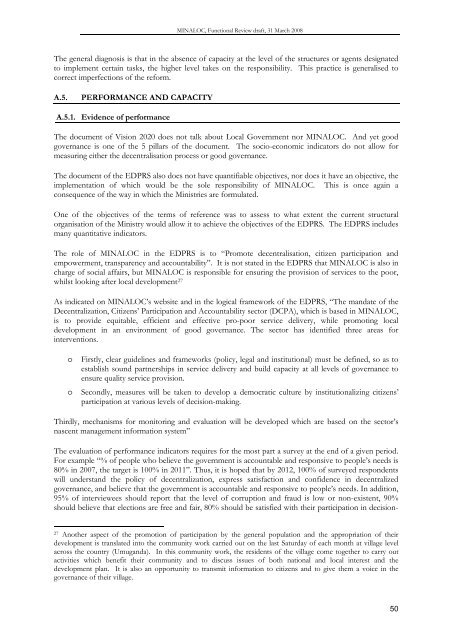

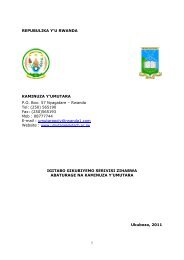
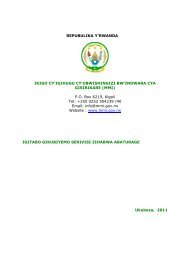

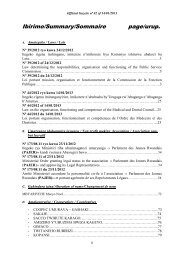
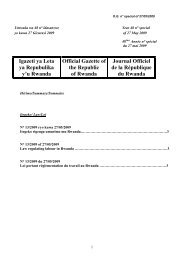
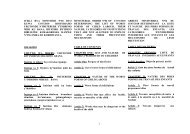
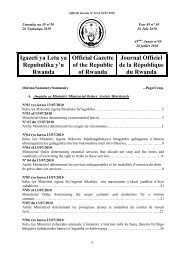
![Official Gazette n°27 of 05[1]. - Mifotra](https://img.yumpu.com/10476421/1/184x260/official-gazette-n27-of-051-mifotra.jpg?quality=85)
